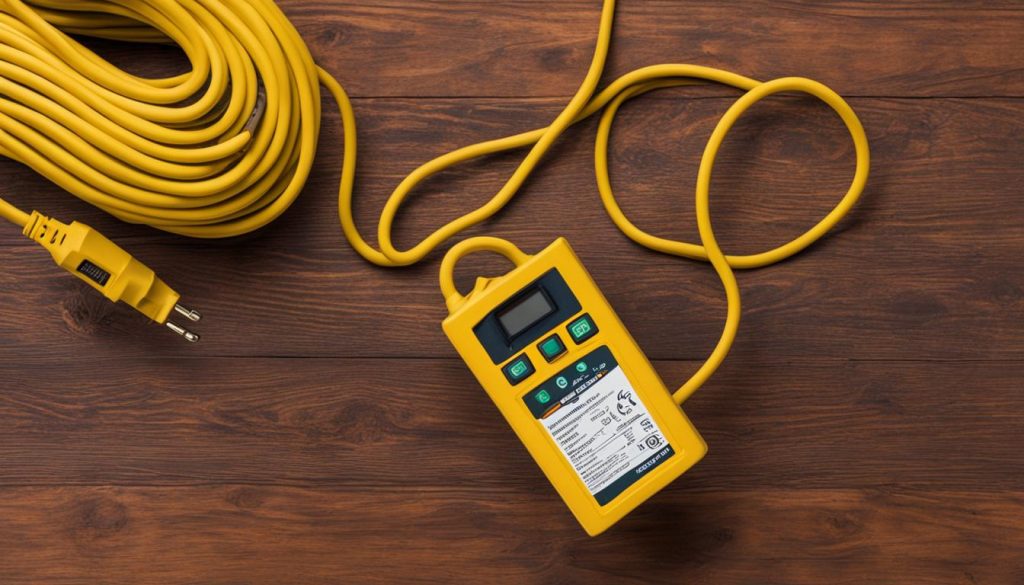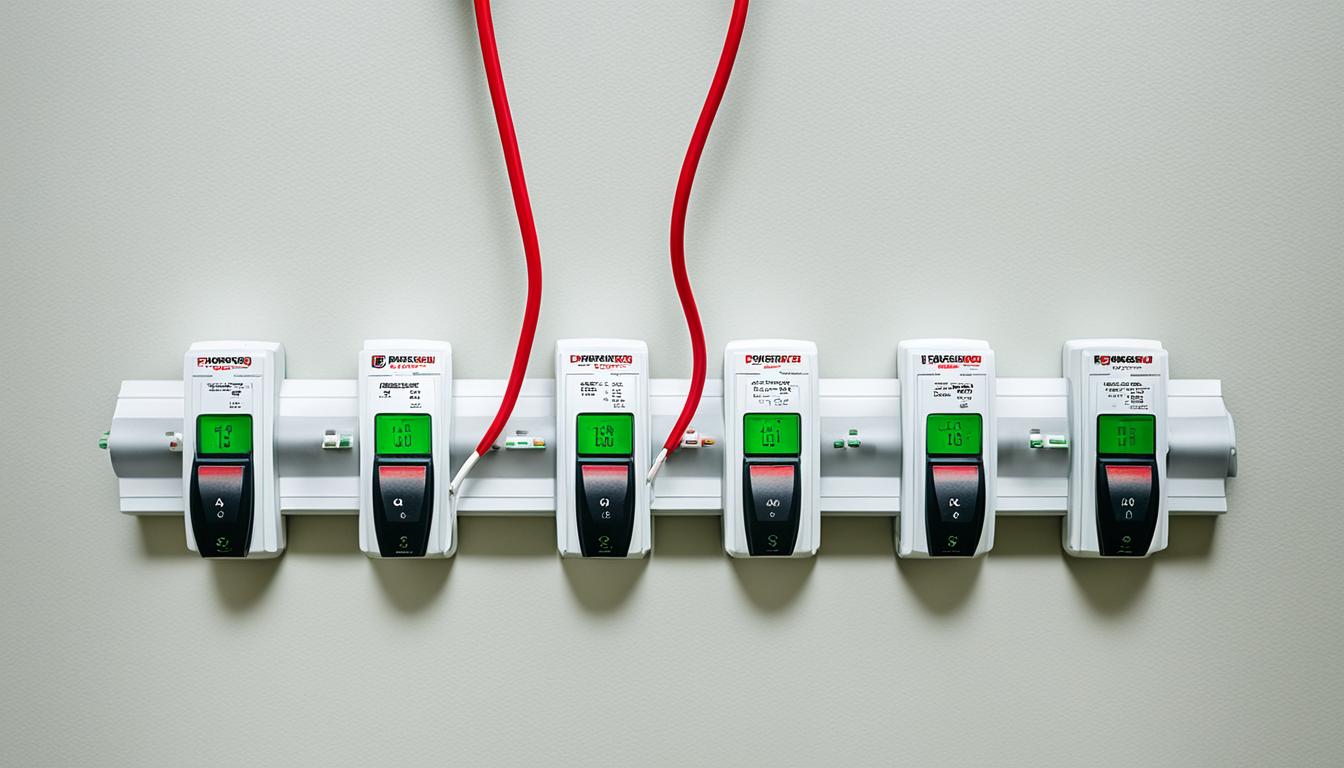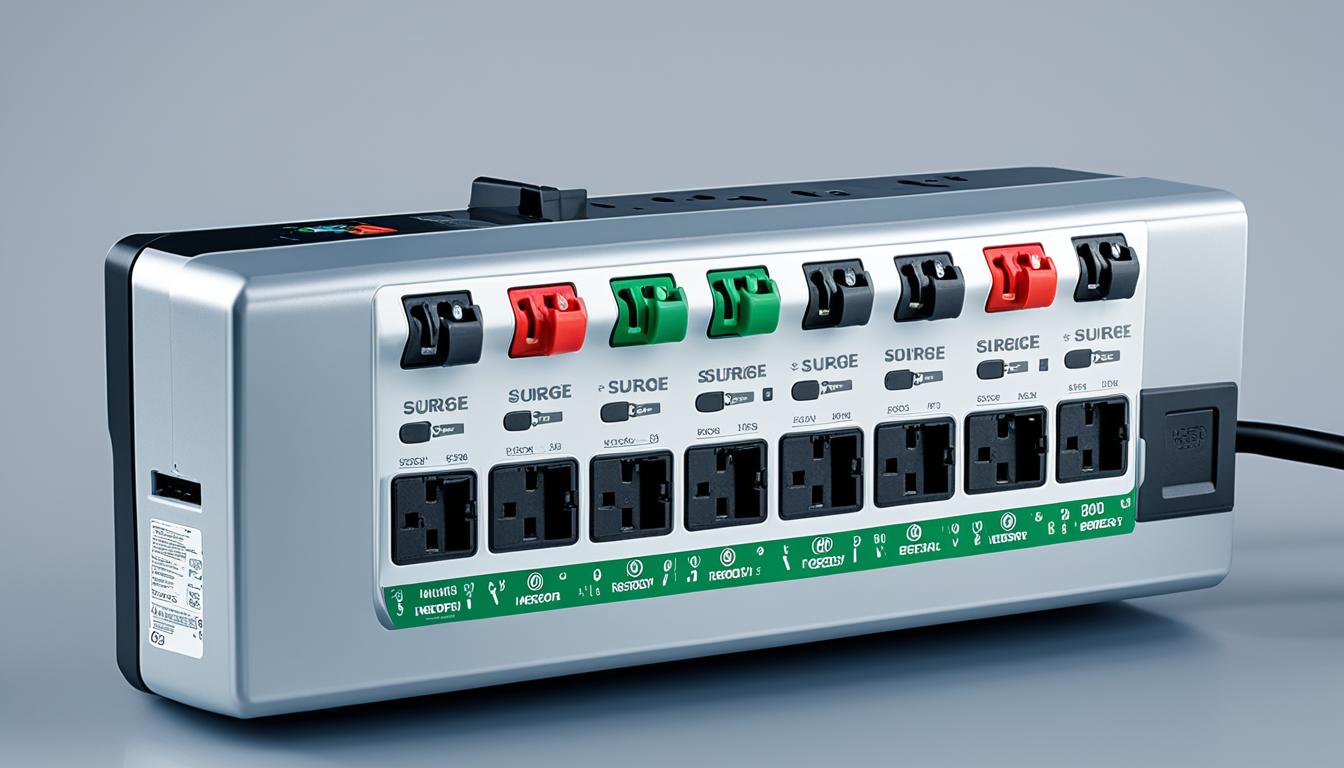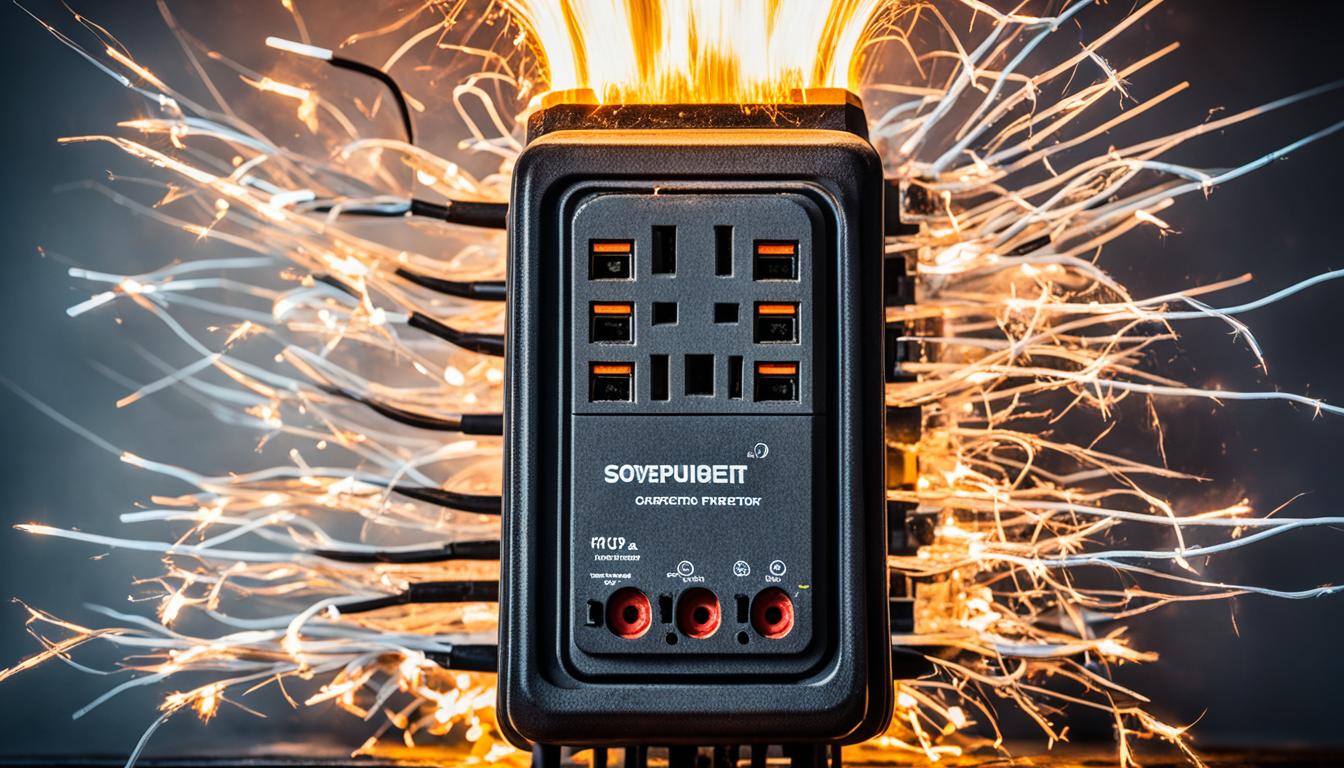An extension cord is a crucial tool for powering devices that are located far from an outlet. It allows you to extend electrical connections safely and conveniently. But choosing the right extension cord for the job is essential to ensure proper functioning and prevent any potential hazards. In this article, we will discuss the different types of extension cords, their specifications, and why the 220 volt extension cord is widely used for various applications.
Key Takeaways:
- Extension cords are essential for extending electrical connections to devices located far from an outlet.
- Choosing the right extension cord is crucial for safety and proper functioning.
- The 220 volt extension cord offers compatibility and safety for a wide range of applications.
- Consider factors such as voltage, length, material, and wire thickness when selecting or making an extension cord.
- Follow OSHA guidelines and consider voltage drop limits for safe and effective use of extension cords.
+
Understanding the Basics of Extension Cords
An extension cord is a simple yet important electrical component that consists of electrical wires covered in insulation and equipped with plugs on both ends. When an electrical current passes through a wire, heat is generated. Prolonged current flow can lead to overheating, melting of the insulation, and even the risk of short circuits and fires. Using the proper extension cord for each device and situation is crucial to ensure safe and reliable operation.
To better understand how extension cords work, let’s take a closer look at their key components:
- Electrical wires: These are the conductive paths through which electrical current flows. They are typically made of copper or aluminum.
- Insulation: The wires are covered in a protective layer of insulation to prevent contact with other objects and to contain the electrical current.
- Plugs: Extension cords have plugs on both ends, allowing them to connect to power sources and devices.
When using an extension cord, it’s important to consider the flow of electrical current and the generation of heat. If the extension cord is not designed to handle the electrical load of the connected devices, it can overheat and pose a safety hazard.
Remember, a well-insulated and properly rated extension cord is essential for preventing short circuits and fires.
Choosing the right extension cord for the task requires considering factors such as the type and electrical load of the devices, the length of the extension cord, and the rating of the cord itself. It’s important to use extension cords that are suitable for outdoor or indoor use, depending on the specific requirements of your project or situation.
Key Specifications for an Ideal Extension Cord
In order to ensure safe and efficient operation, it is important for an extension cord to meet certain power specifications. These specifications include:
- Amps: Amps, or amperes, measure the flow of electrical current through a conductor. It is crucial to select an extension cord with an amp rating that matches or exceeds the requirements of the electrical device or appliance it will be used with.
- Voltage: Voltage, measured in volts, is the electrical force that drives the flow of electrons. Choosing an extension cord with the correct voltage rating is essential to ensure compatibility and prevent electrical damage.
- Gauge: The gauge of an extension cord refers to the diameter of its conductors. A larger gauge allows for better power transmission and reduces the risk of voltage drop. It is important to consider the gauge size when selecting an extension cord for a specific application.
- Length: The length of an extension cord can impact its performance. Longer extension cords can result in increased electrical resistance, leading to a decrease in power delivery. Selecting the appropriate cord length for the desired application is crucial to maintain optimal power transmission.
To summarize, an ideal extension cord should have the appropriate amp rating, voltage compatibility, suitable gauge size, and an optimal length to ensure safe and efficient power transmission.

Benefits of Extension Cords
Extension cords offer a range of benefits, making them a valuable tool for various electrical needs. From fire prevention to protecting electrical components, extension cords play a crucial role in ensuring safety and efficiency in electrical management.
One of the key advantages of using extension cords is their ability to prevent fires. By providing a safe and reliable connection, extension cords help avoid potential hazards caused by poor electrical management or exposed circuits. This is particularly important in environments where multiple electrical devices are used simultaneously, minimizing the risk of overheating or electrical overloads.
Another significant benefit of extension cords is the prevention of electrocution. Many modern extension cords incorporate safety mechanisms such as automatic sensors and shut-off circuits. These features detect abnormal electrical currents and ensure immediate disconnection, protecting users from electric shocks and other electrical accidents.
Furthermore, extension cords offer valuable protection for electrical components. By using extension cords, you can safeguard your devices and equipment from wear and strain. Extension cords serve as a buffer between the electrical outlet and the connected devices, preventing direct strain on the equipment and prolonging their longevity.
| Extension Cord Benefits |
|---|
| Fire prevention |
| Electrocution prevention |
| Protection for electrical components |
In summary, extension cords provide numerous advantages, including fire prevention, electrocution prevention, and protection for electrical components. By utilizing extension cords correctly and following safety guidelines, you can create a secure and efficient environment for all your electrical needs.

The 220 Volt Extension Cord: Aspects to Consider
When it comes to choosing a 220 volt extension cord, there are several important aspects to consider to ensure optimal performance and safety. These aspects include voltage, length, material, and wire thickness.
Voltage: The voltage requirement of your devices or equipment will determine the type of extension cord you need. A 220 volt extension cord is designed specifically for devices that require higher voltage levels, such as heavy-duty appliances and industrial machinery.
Length: The length of the extension cord is another crucial factor to consider. Longer extension cords can experience voltage drop, which can reduce the power delivered to your devices. It is essential to choose the appropriate length based on your specific needs to minimize voltage drop and ensure optimal power transmission.
Material: The material of the extension cord plays a significant role in its durability and conductivity. Copper is the preferred material for extension cords due to its low resistance and excellent conductive properties. It ensures efficient power transmission and reduces the risk of overheating or electrical hazards.
Wire Thickness: The wire thickness, also referred to as wire gauge, is an important consideration to minimize voltage drop and maintain the safe operation of your devices. Thicker wires offer lower resistance and allow for better power transmission. It is crucial to choose an extension cord with an appropriate wire thickness to match the power requirements of your devices.
By carefully considering these aspects when choosing or making a 220 volt extension cord, you can ensure safe and effective power transmission for your high-voltage devices.
Benefits of Using the Correct Wire Gauge
Using the correct wire gauge for your extension cord has several benefits:
- Minimizes voltage drop
- Maximizes power delivery
- Reduces the risk of overheating
- Ensures safe operation of devices
- Prevents electrical hazards
Choosing the right wire thickness is crucial to ensure optimal power transmission and safety when using a 220 volt extension cord.
Maximum Length and Choosing the Right Wire Gauge
When it comes to using extension cords, it’s crucial to consider both the maximum length and the appropriate wire gauge. The Occupational Safety and Health Administration (OSHA) generally recommends a maximum extension cord length of 100 feet. However, it’s important to keep in mind the concept of voltage drop.
Voltage drop refers to the decrease in electrical voltage that occurs when current travels through a wire. As the length of the extension cord increases, so does the potential for voltage drop. This can lead to reduced power delivery and affect the performance of your devices.
To mitigate voltage drop, it’s essential to choose the right wire gauge for your extension cord. The wire gauge refers to the thickness of the wire used in the cord. A lower gauge number indicates a thicker wire, which can handle higher current and minimize voltage drop.
The National Electric Code provides guidelines for voltage drop limits at the farthest outlet of the branch circuit. By adhering to these guidelines, you can ensure efficient power transmission and prevent any potential issues.
If you’re unsure about which wire gauge to choose, online calculators are available to help determine the minimum wire thickness required for a specific ampacity, voltage, and extension cord length. These calculators take the guesswork out of selecting the appropriate wire gauge, ensuring safe and effective operation.
Wire Gauge and Current Rating
| Wire Gauge (AWG) | Current Rating |
|---|---|
| 18 | 10 amps |
| 16 | 13 amps |
| 14 | 15 amps |
| 12 | 20 amps |
| 10 | 30 amps |
As the table shows, a higher gauge number means a lower current rating. Therefore, when using a long extension cord or powering devices with higher current requirements, it’s crucial to select a lower gauge wire to prevent excessive voltage drop.
Conclusion
Ensuring extension cord safety and proper power transmission is crucial when using electrical devices. By selecting the right extension cord, you can minimize the risk of electrical hazards and promote safe operation. Consider important factors such as voltage, length, material, and wire thickness when choosing or making an extension cord.
It is also essential to follow the Occupational Safety and Health Administration (OSHA) guidelines, which provide valuable recommendations for using extension cords safely. By adhering to OSHA guidelines and considering voltage drop limits, you can prevent potential accidents and protect your electrical devices.
Compatibility is key when it comes to extension cords. Make sure to choose an extension cord that matches the power requirements of your electrical devices. This will not only ensure optimal performance but also prolong the longevity of your equipment.
By prioritizing safety, proper power transmission, compatibility, and following OSHA guidelines, you can confidently use extension cords for your various electrical needs. Power up your appliances and equipment safely and reliably with the right extension cord for the job.
FAQ
What is an extension cord?
An extension cord is a set of electrical wires with insulation and plugs on both ends that allows for the extension of electrical connections to devices that are located far from an existing outlet.
Why is it important to choose the right extension cord?
It is crucial to choose the right extension cord for the task to ensure safety and proper functioning.
What are the different types of extension cords available?
There are different types of extension cords available, including light-duty, medium-duty, and heavy-duty cords.
What are the specifications of an ideal extension cord?
The specifications of an ideal extension cord include proper gauge size, suitable voltage and amperage ratings, and an appropriate length that minimizes voltage drop.
What are the benefits of using extension cords?
Extension cords offer several benefits, including fire prevention, electrocution prevention, and protection for electrical components.
What should be considered when choosing a 220 volt extension cord?
When making or choosing a 220 volt extension cord, several aspects need to be considered, including voltage, length, material, and wire thickness.
What is the maximum recommended length for an extension cord?
The maximum length of an extension cord generally recommended by OSHA is 100 feet. However, voltage drop should also be considered when choosing the right extension cord length.
How do I choose the right wire gauge for an extension cord?
The appropriate wire gauge for an extension cord can be determined by considering factors such as ampacity, voltage, and extension cord length. Online calculators are available to help with this.
Why is it important to select the right extension cord?
Choosing the right extension cord is essential for ensuring safety, proper power transmission, and compatibility with various electrical devices.
What guidelines should be followed for the safe use of extension cords?
Following OSHA guidelines and considering voltage drop limits will help ensure the safe and effective use of extension cords.


